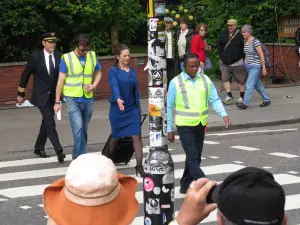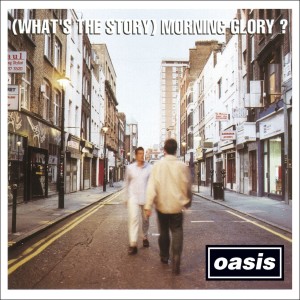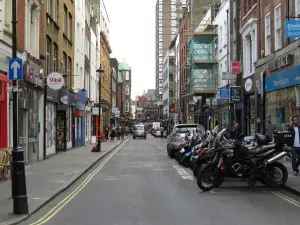Believe it or not, there is a disorder known as Paris Syndrome where tourists visiting a country in Western Europe suffer from such culture shock that they become delusional or show signs of other psychological manifestations like anxiety. There are articles of hospitals taking in patients suffering from Paris syndrome.
It’s been a couple of days since I got back home from the UK now, and I think I may have fallen under what they call Paris Syndrome. No, I’m not in a hospital or having breakdowns, but perhaps I came into the country with many delusions. I say this because I came under the firm beliefs that the UK was the Mecca for rock music. Sure, the United States can take the title for creating the blues, the United Kingdom gave us so many bands that shaped modern rock and pop music. So to people in the 21st century still suffering from Beatlemania or another form of rock n’ roll obsession- like myself, traveling through the UK might have be the equivalent to making a spiritual pilgrimage.
I made a playlist on my mp3 of all my English favorites to get psyched for the adventure, packed my luggage, and set off to the land of The Libertines, Oasis and crumpets. I thought I was going to a land where rock groups were fostering their craft and paving the music industry forward.
But I came back to the states feeling that England was not quite that. I got to see Abbey Road Studios. As one would expect, pedestrians were at war with drivers trying to get time to pose walking down the intersection like the Beatles album, but in addition a video crew came in to shoot a commercial for an airline company. As actors dressed as pilots and passengers crossed down the street, directors and videographers were yelling, blocking traffic and doing whatever they could to get their shot.


In addition, two of England greats Eric Clapton and Paul McCartney were playing in concert, but prices for those shows were ridiculous to say the least.
And in Liverpool, the legendary Cavern Club was turned into a tourist trap. Sure, I did have a sentimental moment looking at photos of some of my favorite groups on the wall while a Liverpool local was covering various Beatles songs. The venue was packed to the brim with people of all ages who grew up listening to the Beatles. While capturing multiple generations of fans long after their career is truly an achievement, there was something overly nostalgic about the whole place.
At this point, all I really I saw were fans and tourists looking back on the age classic rock with a sense of awe, nothing much else.Thoughts were going on in my head that the music industry at least in England was in danger of being stagnant, or at least complacent of its former glory. For example I stumbled by the original Reckless Records in London. That the street photographed on cover of the Oasis album (What’s The Story) Morning Glory? was only a couple of blocks away from the bread and breakfast my family was lodging in. But so much had changed around the street. Restaurants and clubs were now playing house music, and only one or two people in the record store looked like they were under 30 years old. Had rock music in England become nothing more than men in their golden years reliving the past and young people hoping for new Beatles, only to be disappointed.


I was becoming more pessimistic not only on England, but on the future of rock music itself. I wasn’t the only one thinking this. According NME magazine, rock promoter Harvey Goldsmith expressed saddened views on the music festival scene saying they will never be as good as they once were.
“It really peaked about two years ago. There’s too many of them and there are not enough big acts to headline them. That is a big, big problem in our industry,” Goldsmith And we are not producing a new generation of these kind of acts – the likes of the Rolling Stones, Muse, even Arctic Monkeys – that can headline.”
But fortunately, unplanned events rekindled my spirits. At the underground level of a Soho bar, I had the pleasure of hearing some blues from both professional and non-professional musicians. And as one guitarist blew me away with a solo, I couldn’t but wonder if maybe rock wasn’t dead hear. I asked a woman who this shredder was.
“That’s my husband, David Gilchrist,” the woman said. “He works as the creative director of an advertising firm, but he’s so good that I think he should go pro.”
[youtube http://www.youtube.com/watch?v=GoSrqWYL8Vg&w=560&h=315]
England is place that is filled with music, but as the genres of the industry become more diverse, it’s hard to tell which direction it will move forward in. Between a studio living in legend, store owners forced to listen to Beatles music at least eight hours a day, an excellent blues guitarist, over-priced concerts and dad-rockers as far as the eye can see, England is a place where people are either trapped in the past or looking for something else to move along in the future. And as someone who wants to see the next band who creates music that outlives the members themselves, I’m not sure if our next mania will come from Britain.
There are many good musicians and producers still in the UK, thats for sure, but making it big with a guitar these days is hard. Everyone from Harvey Goldsmith to David Gilchrist knows this. I’m not sure if the next rock invasion, if there ever will be another rock invasion, will come from Britain again.
- Today in Music History: April 7 - April 7, 2023
- EP Review: Michigander’s It Will Never Be The Same - March 31, 2023
- Deep Dive: Spotify’s ALT NOW Playlist - March 30, 2023








